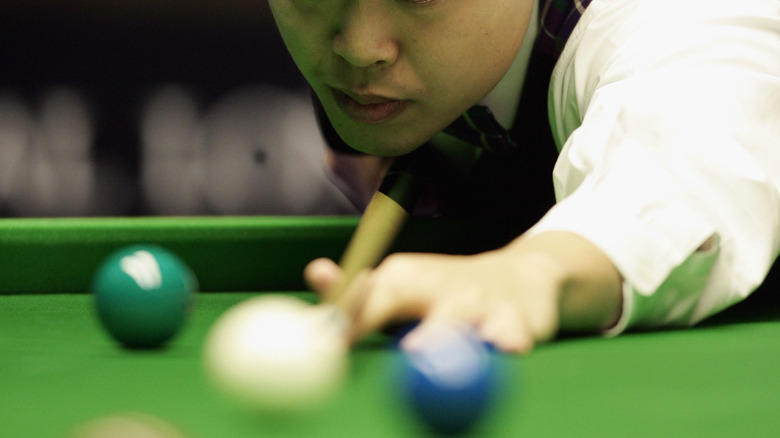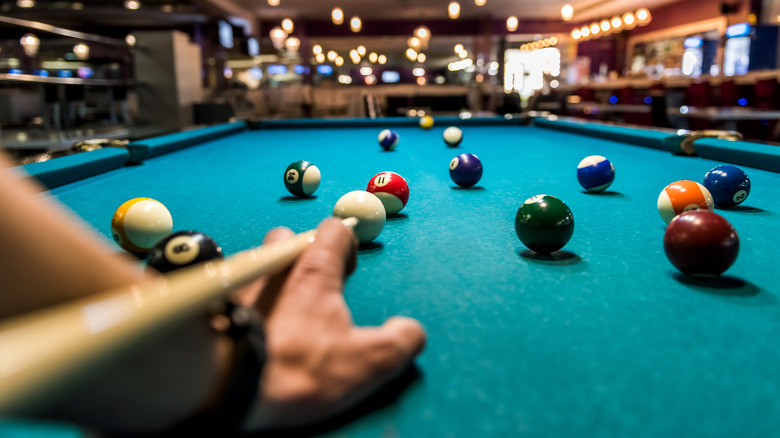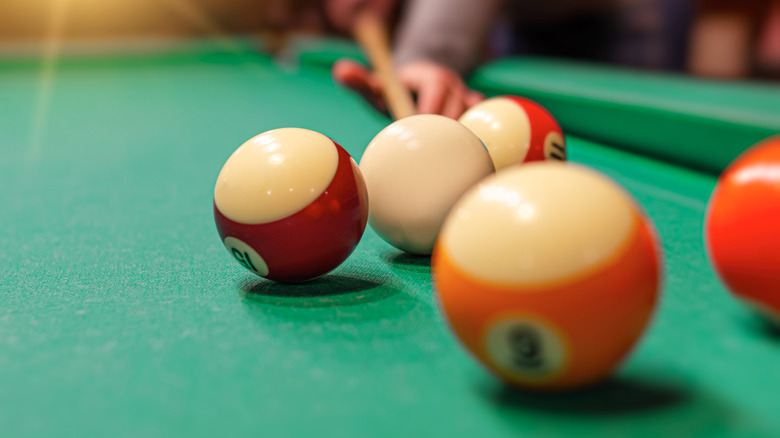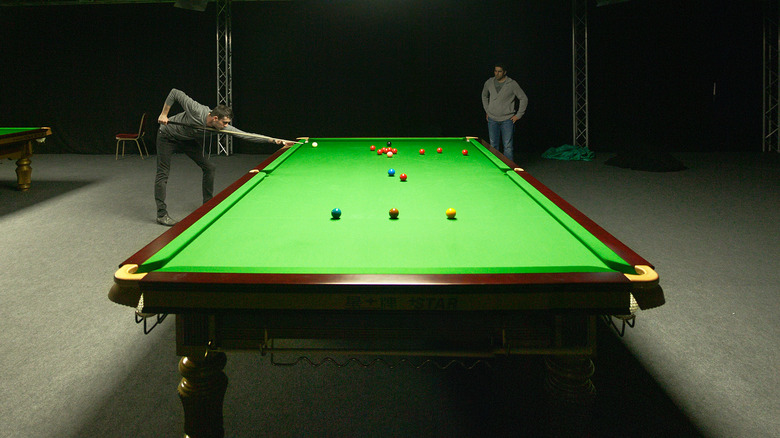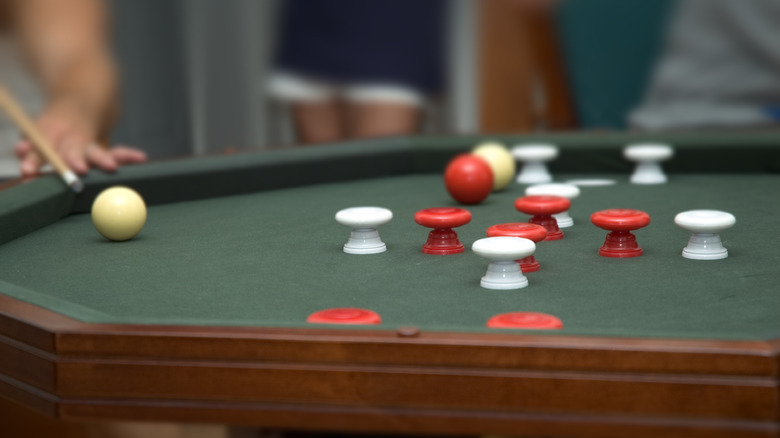What Is The Difference Between Billiards, Pocket Billiards, Pool, And Snooker?
Pool is one of those games, like darts or video poker, that you only play when the opportunity strikes you — for example, when you're at a bar that has a pool table. Sure, you could install a pool table at home, but even inexpensive ones cost hundreds of dollars, take up a lot of space, weigh a ton, and are next to impossible to move when it's time to sell the house. Nevertheless, tens of millions play pool in the United States; or at least, as recently as 2013, according to Statista, approximately 35 million Americans played pool.
Pool is actually one of several games played on a table with balls and a cue. According to manufacturer Blatt Billiards, billiards and its variant games are one thing, while pool and its alternatives are another. The same manufacturer notes that both billiards and pool have multiple variant games. And then there's snooker, which uses similar equipment but is in a category all its own (via Game Tables Online).
It can all be a bit confusing, so let's try to sort it out.
Cue Sports
Pool, billiards, snooker, and all related and variant games fall under the umbrella of what is called "cue sports." The reason for this should be obvious: they involve using a cue to manipulate the outcome.
No one is certain where tabletop cue sports originated, according to AZBilliards.com, but the general consensus is that they emerged from lawn-based games involving sticks and balls, such as golf or croquet. As Britannica notes, France, England, China, Italy, and Spain have all claimed to be the originator of the games that would eventually be known as billiards or some variant, although the true place of origin is lost to history. What's known for certain is that the first written mention of cue sports comes from England in the 15th century. The proto version of the game enjoyed immense popularity among English and French aristocrats. Over the centuries, the game evolved into the various cue-based games we have, helped along by changing technology.
Pool/Pocket Billiards vs. Billiards
Depending on whom you ask, pool and billiards are either the same thing (one played with pockets, the other without) or two different things. Further still, Mental Floss reports that another name for pool is "pocket billiards," as it's a billiard-based game with pockets (that is, holes into which the balls are aimed). Blatt Billiards treats billiards and pool/pocket billiards as completely different sports.
According to Blatt Billiards, billiards has no pockets, has a bigger table with a different type of surface (when compared to pool), utilizes a slightly longer cue, and utilizes only three balls — a white cue ball, a yellow cue ball, and a red "object ball." As The UK Rules explains, the competitors will agree upon the number of points required to win (generally 300 for a friendly match), and the first person to meet or exceed that goal wins. Points are scored by knocking the balls into each other and/or the rails, with various combinations awarding more points. Pool, on the other hand, utilizes pockets, and the goal is to knock the balls into them.
Variants of billiards include straight-rail, one-cushion, balkline, and others, while variants of pool include eight-ball, nine-ball, one pocket, and others.
Snooker Is Its Own Thing
Now we come to snooker, which, again, depending on whom you ask, is either a variant of pool (which is itself a variant of billiards, according to some definitions) or its own thing entirely. For purposes of this article, snooker will be treated as a completely different thing for reasons that will become obvious.
According to Difference Between, snooker is played on a considerably larger table than pool — 10 feet for American games, 12 feet for British competitions. Further still, snooker's balls are smaller (and not numbered, according to Game Tables Online), as are its pockets, making it a more challenging game. Despite these differences, the basic gameplay is largely the same: the goal, according to Rules of Sport, is to knock the balls into the pockets, although the similarities in gameplay begin and end there.
Finally, there's a cultural consideration: While pool is the most popular cue sport in the United States, in Britain and its former colonies — Canada, India, Australia — snooker is, by far, the more popular sport. Indeed, you're unlikely to see a billiards competition on TV in the U.S. except when ESPN or some other sports network has a programming spot to fill. By comparison, the 2022 World Snooker Championship was a huge television event in Old Blighty, with some 4.5 million viewers (via Sporting Life).
Other Cue Sports And Their Variants
Readers of a certain age may remember a time when bumper pool (depicted above) was all the rage. As Love Cue Sports notes, the game probably emerged in Europe in the 16th century and reached its peak of popularity (in the United States at least) in the 1970s and 1980s. As is patently obvious by the name, bumper pool adds obstacles to be avoided or bounced off of, adding a layer of complexity to the game.
Russian pyramid pool is big in Russia (go figure) and Eastern Europe (via CuesUp). It's basically pool, only with a red cue ball and 16 numbered white balls. Compared to their Western counterparts, the table is bigger, the balls are bigger and heavier, and the pockets narrower. Finally, there's kaisa, which, according to Fancy Odds, is almost exclusively played in Finland. The sport is played with balls of varying colors, and scoring is based on players achieving certain outcomes. For example, by knocking balls of a certain color into the pockets.
